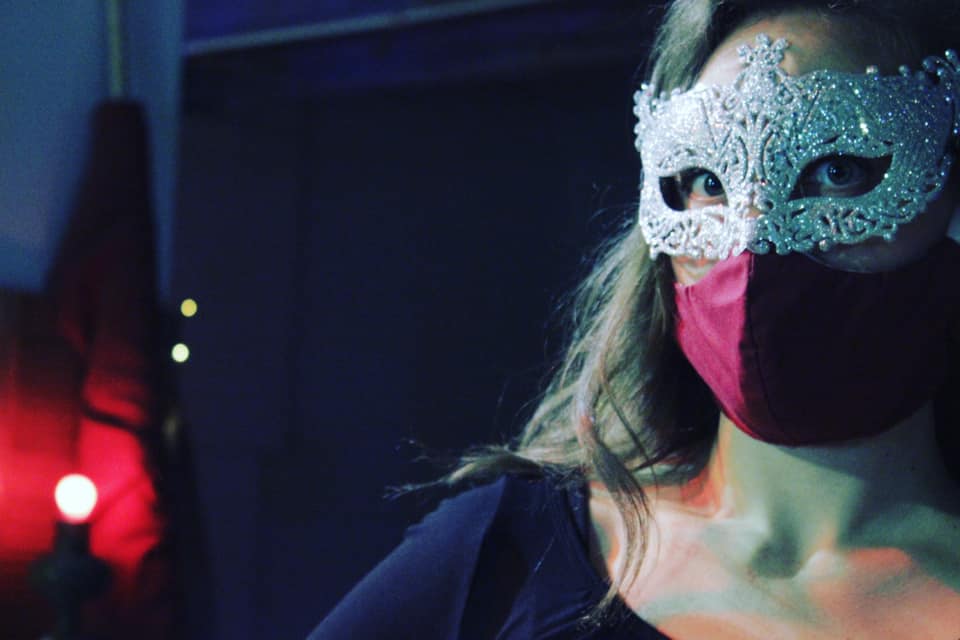SALT LAKE CITY — Rolling into the second floor of the North Gateway parking lot, I was thrilled to be venturing into my first theatre performance experience in three months. One of my final public outings before the virus shutdown was to a brilliant performance just half a block away. I have missed the joy of immersing myself in storytelling and sitting among strangers. As I was directed to my designated parking spot and tuned my radio to the provided frequency, it was easy to reflect on just how much has changed in the last 90 days. SONDERimmersive has created Through Yonder Window specifically for this brave new world, and like the rest of the audience, I viewed it from the entirely protected space of my car. Having a deep affection for Shakespeare and Romeo and Juliet, I was also itching to find out what new insights this production could bring me by using such an innovative approach.

The parking garage has been beautifully decorated to create the world of Verona, complete with lighting, tapestries, and furniture which, creates a sort of homebase for each character. Clearly scenographer Joseph Wheeler and art director Jake Buntjer gave a great deal of care in creating the details of the space. But I was quickly disappointed to realize I would not be able to see any of it beyond the limited view of my car windows. Cars are strategically parked in a staggered formation encircling the stage space, so while I could see pretty clearly into the lives of the families in the cars to my left and right, I was unfortunately blocked from any meaningful view of about 60% of the performance.
Mine among the last few cars to arrive, and in the 20 minutes or so, that we waited for the performance to begin, I wondered if it would have been feasible to allow the audience the freedom to carefully wander the large space in the safety of our masks. At least during the waiting time, and throughout the performance, composer Wachira Waigwa-Stone’s music provided an inviting and emotive soundtrack.
The performance does deliver on SONDERimmersive’s goal of combining theatre and dance in an audience-interactive space. And the choice to explore the classic tragedy of Romeo and Juliet through a kind of post-COVID apocalypse lens offers some stimulating, if despairing, reflections on the divided and plague-ridden present. Before and after the show there is encouragement for the audience to return to Verona to take in a new perspective on the 60-minute production, but to be frank, the action I could see did not compel me to make a return journey. As the storytelling unfolded around the classic plot, character choices became so confusing that I am not at all sure who lived and who died. Worst of all, by the time the performance ended I was not sure I cared.
Of those I could see, the performers came across as stilted. Their choreography is marked by artistic director Graham Brown’s elegant style, but suffers from clumsy execution. The performers spend much of the hour with masks over their mouths and noses, making facial expressiveness a special challenge. Again and again, the performers cross up and down the slanted concrete floor, dancing and fighting their way over the hot, dirty garage and around the audiences’ cars. They are certainly exhausting themselves. I only hope they have enough energy to manage this feat twice each night.
The radio frequency plays the cast’s readings of Shakespeare’s text. Unfortunately, the actors, and Jacob Baird as Romeo in particular, skim over the poetry of moments like the balcony scene. Writer Rick Curtiss’s original prose fills in the rest. He chooses to explore the characters in new ways, such as Tybalt being a quasi-religious zealot and Mercutio being a freethinking radical, but beyond that Curtiss’s script takes the plot in directions that are neither logical nor inspiring. It is rare for me to be able to pinpoint the exact moment a performance loses me entirely, but Romeo’s sudden choice to abandon Juliet after their wedding night because . . . reasons, and Juliet’s subsequent decision to actually kill herself for . . . revenge? Or was she just faking her death? It is not clear. Nadia Sine’s Juliet did capture a solid emotional range, and she seemed more comfortable than some in her movement. To be fair, though, I saw so little of some of the other cast members that it is difficult to be able to give much judgement on their performances.
The show began with a few words from Brown regarding the grief society faces in these unprecedented times: grief for the ongoing pain of racial injustice in our world, grief for the suffering brought on by the Corona Virus, and the grief of the local theatre community at the loss of our friend and colleague Chris Clark. It was comforting to hear his words, and to spend a moment of silence together-apart with others who love the stage as much as I do. Our collective grief, as we sat together in our isolation, in a beautiful artistic space was perhaps the most powerful part of the evening. I applaud the creative leap SONDERimmersive has taken in developing Through Yonder Window. I hope they and other theatre companies will continue to push and explore the boundaries of theatre and performance throughout this time of grief and isolation.
[box]SONDERimmersive’s Through Yonder Window performs on the second level of the north parking garage of the Gateway mall (400 West 100 South, Salt Lake City) at 6PM and 8PM Thursdays through Saturdays through July 3. Tickets are $45 per car and can be purchased here.[/box]

